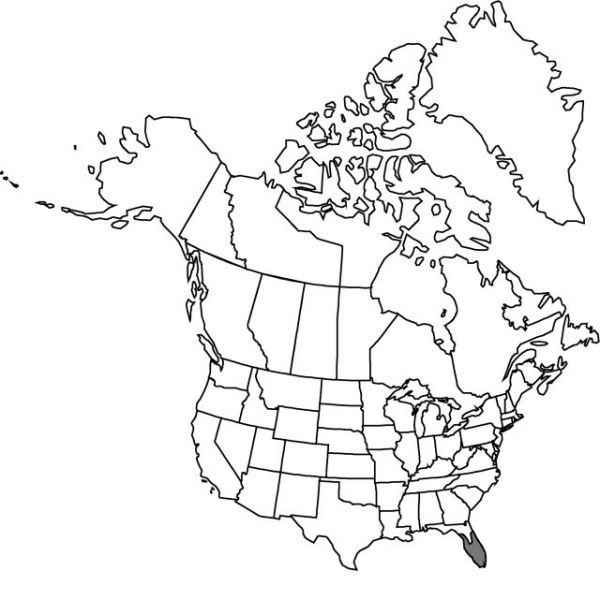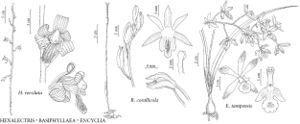Difference between revisions of "Encyclia tampensis"
Fl. Miami, 56. 1913.
FNA>Volume Importer |
imported>Volume Importer |
||
| (6 intermediate revisions by 2 users not shown) | |||
| Line 8: | Line 8: | ||
}} | }} | ||
|common_names=Florida butterfly orchid | |common_names=Florida butterfly orchid | ||
| − | |basionyms={{Treatment/ID/ | + | |special_status={{Treatment/ID/Special_status |
| + | |code=F | ||
| + | |label=Illustrated | ||
| + | }} | ||
| + | |basionyms={{Treatment/ID/Basionym | ||
|name=Epidendrum tampense | |name=Epidendrum tampense | ||
|authority=Lindley | |authority=Lindley | ||
| + | |rank=species | ||
| + | |publication_title=Edwards’s Bot. Reg. | ||
| + | |publication_place=33: plate 35. 1847 | ||
}} | }} | ||
|synonyms={{Treatment/ID/Synonym | |synonyms={{Treatment/ID/Synonym | ||
|name=Encyclia tampensis | |name=Encyclia tampensis | ||
|authority=(Lindley) Schlechter | |authority=(Lindley) Schlechter | ||
| − | }}{{Treatment/ID/Synonym | + | |rank=species |
| + | }} {{Treatment/ID/Synonym | ||
|name=Epidendrum tampense var. albolabium | |name=Epidendrum tampense var. albolabium | ||
|authority=A. D. Hawkes | |authority=A. D. Hawkes | ||
| + | |rank=variety | ||
}} | }} | ||
|hierarchy=Orchidaceae;Orchidaceae subfam. Epidendroideae;Orchidaceae tribe Epidendreae;Orchidaceae (tribe Epidendreae) subtribe Laeliinae;Encyclia;Encyclia tampensis | |hierarchy=Orchidaceae;Orchidaceae subfam. Epidendroideae;Orchidaceae tribe Epidendreae;Orchidaceae (tribe Epidendreae) subtribe Laeliinae;Encyclia;Encyclia tampensis | ||
| Line 33: | Line 42: | ||
|elevation=0–100 m | |elevation=0–100 m | ||
|distribution=Fla.;West Indies (Bahamas). | |distribution=Fla.;West Indies (Bahamas). | ||
| − | |discussion=<p>Flowers of Encyclia tampensis are fragrant, with a sweet or honey odor, starting about noon and peaking in early afternoon when small bees in genera Auglochlora and Halictus pollinate the flowers.</p> | + | |discussion=<p>Flowers of <i>Encyclia tampensis</i> are fragrant, with a sweet or honey odor, starting about noon and peaking in early afternoon when small bees in genera Auglochlora and Halictus pollinate the flowers.</p> |
|tables= | |tables= | ||
|references= | |references= | ||
| Line 42: | Line 51: | ||
-->{{#Taxon: | -->{{#Taxon: | ||
name=Encyclia tampensis | name=Encyclia tampensis | ||
| − | |||
|authority=(Lindley) Small | |authority=(Lindley) Small | ||
|rank=species | |rank=species | ||
| Line 56: | Line 64: | ||
|publication title=Fl. Miami, | |publication title=Fl. Miami, | ||
|publication year=1913 | |publication year=1913 | ||
| − | |special status= | + | |special status=Illustrated |
| − | |source xml=https:// | + | |source xml=https://bitbucket.org/aafc-mbb/fna-data-curation/src/2e0870ddd59836b60bcf96646a41e87ea5a5943a/coarse_grained_fna_xml/V26/V26_1242.xml |
|subfamily=Orchidaceae subfam. Epidendroideae | |subfamily=Orchidaceae subfam. Epidendroideae | ||
|tribe=Orchidaceae tribe Epidendreae | |tribe=Orchidaceae tribe Epidendreae | ||
Latest revision as of 21:12, 5 November 2020
Plants to 50 cm. Pseudobulbs aggregate, dark green, ovoid-pyriform, 1–7 × 1–2.5 cm. Leaves 1–3, linear-lanceolate, 8–40 × 0.5–2 cm, leathery. Inflorescences racemes to panicles, lax, 10–80 cm. Flowers 3–45, green, yellow, or brown, often suffused with purple; sepals and petals similar, extended, oblanceolate-spatulate, 12–22 × 4–6.5 mm, apex obtuse; lip white, deeply 3-lobed, 12–18 × 12–18 mm when spread, middle lobe usually with large purple spot, suborbiculate, 6–10 mm wide, margins undulate, lateral lobes purple-veined, ovate-triangular; callus on isthmus; anthers 1, yellow; column straight, prominent wings on sides of stigmatic cavity, 1 cm. Capsules: pedicel 15–17 mm, body 17–27 × 15 mm, beak 3 mm.
Phenology: Flowering May–Sep; fruiting throughout year.
Habitat: Epiphytic on many different trees and palms in forests and hammocks
Elevation: 0–100 m
Distribution

Fla., West Indies (Bahamas).
Discussion
Flowers of Encyclia tampensis are fragrant, with a sweet or honey odor, starting about noon and peaking in early afternoon when small bees in genera Auglochlora and Halictus pollinate the flowers.
Selected References
None.
